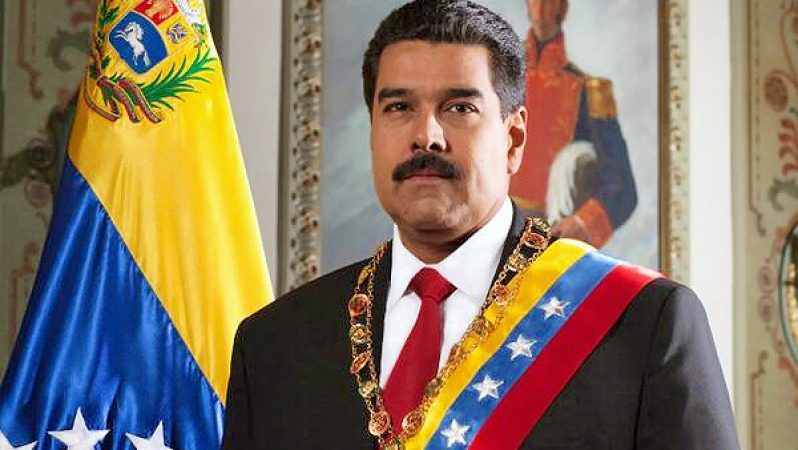–international columnist
–says recent attempts to reignite the issue have backfired
THE long-standing border controversy between Guyana and neighbouring Venezuela has been revived by the Spanish-speaking country’s President Nicolás Maduro in response to the growing domestic political pressure he is facing.
Renowned political and business columnist Arick Wierson stated as much in a recent interview on the Poder Expresso programme. He said that Maduro is facing a growing number of domestic difficulties, such as social unrest, economic instability, and political opposition.
“Let’s go back to the reason why Maduro is doing all this. It’s because he is in a very precarious situation, politically and economically, in the country. Venezuela is dealing with hyperinflation and the economy is in freefall, even though they have the largest oil reserves in the world.
“In other words, it’s an economy in crisis and he is using this whole Guyana story simply as a distraction. The reality is that it’s a unifying issue in Venezuela. The majority of Venezuelans are united around this issue, even though it was resolved long ago. He doesn’t want anyone to focus on his own fraudulent elections, which is what we have there,” Wierson said.
According to the columnist, Maduro is diverting attention from domestic economic problems by “manufacturing an external problem”—a ploy involving a border dispute that his predecessor, Hugo Chávez, had deemed a settled matter.
He added, “Maduro decided to bring up this issue back from the dead, simply to meet the internal political headwinds he is facing today.”
President Maduro’s recent attempts to reignite the border dispute with Guyana have backfired, revealing a significant miscalculation in his strategy, according to Wierson.
He explained, “I think Maduro, when he started this fight with Guyana, he underestimated the kind of leader [President Dr Irfaan Ali] he had facing him on the other side of the table. He thought he could, by leveraging this big military that Venezuela has, that he would manage to intimidate Guyana. And exactly the opposite is happening. Ali is getting closer to the United States, and closer to Brazil. And I think this situation is not going the way Maduro wanted.”

He said Maduro seemingly believed that leveraging Venezuela’s military might intimidate Guyana into making concessions over the disputed Essequibo region. Instead, he noted that President Ali has not only resisted the pressure, but has also taken significant steps to strengthen international alliances, particularly with the United States and Brazil.
Reflecting on a recent interview with President Ali, he mentioned that Ali emphasised the importance of leaving the border dispute to the International Court of Justice (ICJ), allowing the process to unfold on its own timeline. Additionally, Dr Ali, he noted, expressed confidence that the international alliances he has forged will help resolve the situation in due course.
Guyana has maintained that the 1899 Arbitral Award definitively settled the land boundary between Guyana and Venezuela. In January 2018, Guyana handed the controversy over to the United Nations (UN) Secretary-General, who selected a dispute-resolution process in accordance with Article 33 of the UN Charter, since no agreement could be achieved by following the process specified in the Agreement. He chose the ICJ—the UN’s principal judicial organ—to bring resolution to the controversy. As a result, in 2018, Guyana asked the ICJ to “confirm the legal validity and binding effect of the Award regarding the boundary between the colony of British Guiana and the United States of Venezuela, of October 3, 1899,” in an application to institute proceedings against Venezuela. However, a final decision in this significant case might take several years. The ICJ’s decisions are final, binding and without appeal.
Guyana had asked the World Court for provisional measures after Venezuela’s National Assembly, on September 21, 2023, passed a resolution for a referendum on the territory awarded to British Guiana in 1899, now part of Guyana, since its independence in 1966.
Five questions were released by Venezuela’s National Electoral Council for the referendum that was held on December 3, 2023. Approximately 125,000 of Guyana’s 800,000 residents live in the Essequibo area, which makes up nearly two-thirds of Guyana’s landmass.
Pending a final decision in the case, the ICJ has ordered Venezuela to refrain from taking any action which would modify the situation that currently prevails in the territory in dispute, whereby Guyana administers and exercises control over that area (Essequibo).
Last month, Venezuela submitted to the ICJ, its counter-memorial on the merits of the case concerning the Arbitral Award of 3 October 1899 (Guyana v. Venezuela).
The international community has backed Guyana in its efforts to draw attention to Venezuela’s activities, which are wholly outside the bounds of the rule of law and pose a threat to the security and peace of the Latin American and Caribbean Region.
Through the recently signed Argyle Declaration, Guyana, and Venezuela, among other things, reiterated their commitment to the Region remaining a Zone of Peace and agreed to continue dialogue on any other pending matters of mutual importance to the two countries. Additionally, both countries decided they would not, directly or indirectly, threaten or use force against one another in any circumstances, including those consequential to any existing controversies between the two states.
However, last month, the government of Guyana took note of actions by Venezuela to promulgate “the Organic Law for the Defense of Guayana Esequiba.” Venezuela, among other things, continues to increase its military presence near the border with Guyana.














